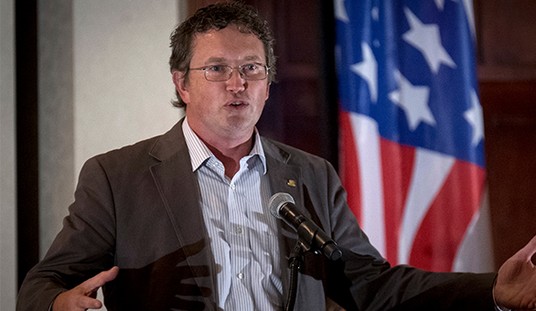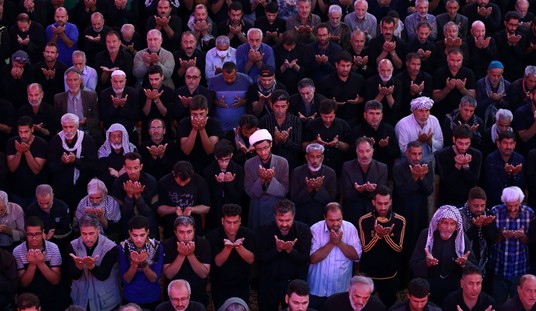“Left’s Attempt At Their Own ClimateGate Based on Forged Document?”, as pondered by Ace of Spades:
Megan McArdle was, to my knowledge, the first to raise red flags over the authenticity of documents from the Heartland Institute, supposedly showing them acting all evil and stuff about the climate.
Most of the documents are real and are fairly bland. But one memo is in dispute. This memo, by McArdle’s reading, seems written not from the point of view of a climate change skeptic — who would naturally see himself as the good guy — but from the point of view of a climate change zealot impersonating a climate change skeptic — and is thus written, oddly, as if the person doing the writing believes himself to be a bad guy.
(My own take: I skipped this because I think the Likely Forged Document itself is pretty bland, too. If this is an attempt at a takedown, it seems pretty subtle to me. But subsequent events seem to show that Megan McArdle was likely right and my lack of interest was likely wrong.)
5. The worldview is different. In my experience, climate skeptics see themselves as a beleaguered minority fighting for truth and justice against the powerful, and nearly monolithic, forces of the establishment. They are David, to the climate scientists’ Goliaths. This is basically what the authenticated documents sound like.The memo, by contrast, uses more negative language about the efforts it’s describing, while trying to sound like they think it’s positive. It’s like the opposition political manifestos found in novels written by stolid ideologues; they can never quite bear (or lack the imagination) to let the villains have a good argument. Switch the names, and the memo could have been a page ripped out of State of Fear or Atlas Shrugged.
Basically, it reads like it was written from the secret villain lair in a Batman comic. By an intern.
McArdle’s theory is that the real information (bland stuff about donors) was in fact obtained by some lefty, but it wasn’t juicy enough. So someone faked up a Memo, basically a digest of the information in the other documents (or through Google), but wrote about that information in the most negative way possible, in order to juice up a pretty weak leak.
Stacy McCain adds, “In Apologizing for Global Warming Hoax, Peter Gleick Blames His Victims”:
The Heartland Institute was victimized by global warming fanatics who published stolen documents and at least one forged document in their attempts to portray the Institute as dishonest.
One of the central figures in this criminal hoax was Peter Gleick of the Pacific Institute, who uses the Huffington Post to offer an excuse:
My judgment was blinded by my frustration with the ongoing efforts — often anonymous, well-funded, and coordinated — to attack climate science and scientists and prevent this debate, and by the lack of transparency of the organizations involved. Nevertheless I deeply regret my own actions in this case. I offer my personal apologies to all those affected.
“It’s not my fault!” The end justify the means: The alleged evil of their opponents excuses any shoddy smear Gleick and his allies may perpetrate against them. And despite their admitted amorality, they wonder why we doubt their claims to “science”?
If it turns out that Gleick had a 2012 RatherGate moment, it wouldn’t be the first time that radical environmentalism has cooked the books, as we’ll discuss on the following page.
Ever since the first Earth Day in 1970, which was accompanied by all sorts of doomsday prognostications which seem like the Woodstock era’s version of Reefer Madness, the apocalyptic tone of radical environmentalism has always encouraged its proponents that truth and skepticism could be discarded in the fight “to save the planet.” (Which we only have ten years to accomplish!) In 2007, Scott Pelley, now the replacement for Katie Couric (remember her?) at CBS, infamously likened global warming skeptics to Holocaust deniers:
While most of the country was watching the Green Bay Packers play the New York Giants, CBS aired an hour-long, severely one-sided special about the threat of global warming.
The special was hosted by CBS’s Scott Pelley. In January 2007, Pelley was asked why he refused to include global warming skeptics in his reporting. He responded, “If I do an interview with [Holocaust survivor] Elie Wiesel, am I required as a journalist to find a Holocaust denier?”
In 2007, Editor & Publisher, which, as its title implies, is a house organ for the MSM, ran an article headlined, “Climate Change: Get Over Objectivity, Newspapers.” The 2009 ClimateGate scandal justifiably transformed the words “hide the decline” into a near household phrase. Last year, when a would-be global warming-themed journalistic ambush against Sen. Jim Inhofe (R-OK) went so badly that Inhofe himself put video of his reply up on YouTube, left-leaning Politico admonished its source for having attempted to gain access to Inhofe by claiming he had a relationship with the Website beyond simply freelancing a few op-eds.
In a 2006 article in the Christian Science Monitor, Julia Gorin spelled out relationship between President Bush’s then-War on Terror, and the left’s then-latest Moral Equivalent of War, global warming. As Julia wrote, “Freud called it displacement. People fixate on the environment when they can’t deal with real threats. Combating the climate gives nonhawks a chance to look tough. They can flex their muscle for Mother Nature, take a preemptive strike at an SUV. Forget the Patriot Act, it’s Kyoto that’ll save you”:
While the hawks among us worry about preventing the Armageddon that’s coming, our modern-day hippies just want to make sure the planet is pristine when it does. In fact, the more menacing terrorism becomes, the more some people seem to worry about the weather. Scared and unsure how to fight terrorists, they confront “climate change,” which only requires spending trillions of other people’s dollars on something that may not need fixing or may not be fixable. No wonder some of these people chain themselves to trees – they think money grows on them.
And that works in the other direction as well — a few months before his carbon footprint was reduced with extreme prejudice by SEAL Team Six, the Washington Post ran a story titled, “Osama bin Laden embraces his inner Al Gore.” And just as fake but accurate documents may have been used against the Heartland Institute, the whacky imams who ginned up the middle eastern riots against the Mohammed cartoons also introduced fake examples, to further enrage the faithful. And speaking of enraging the faithful, in recent years, environmentalist videos have certainly been dialing their eliminationist imagery up to 11.
Al Gore likes to alternately compare environmentalism to the civil rights movement and fighting against the Nazis. Once you’ve decided you’re waging the moral equivalent of war, as this Time cover from 2008 makes explicit, then apparently, all weapons are on the table. Or as Stacy concludes, “I do not accuse Peter Gleick and his fellow fanatics of any Stalinist ambitions, but when we see them engaged in Stalinist methods — publishing forged documents to smear their critics – aren’t we justified in suspecting that they are not otherwise honest?”
Thomas Sowell once told an interviewer:
There’s something Eric Hoffer said: “Intellectuals cannot operate at room temperature.” There always has to be a crisis–some terrible reason why their superior wisdom and virtue must be imposed on the unthinking masses. It doesn’t matter what the crisis is. A hundred years ago it was eugenics. At the time of the first Earth Day a generation ago, the big scare was global cooling, a big ice age. They go from one to the other. It meets their psychological needs and gives them a reason for exercising their power.
As Rahm Emanuel might say, never let a crisis go to waste — especially one you’ve manufactured yourself.
On the following page, sSome quick updates to this post:
Related: Moe Lane has an excellent summary of the events, and notes how difficult it can be to simulate the tone of a memo when you loathe the organization or ideology you’re attempting to emulate:
Megan McArdle took this memo apart, and effectively concluded that it was written after the fact by somebody who was under the mistaken belief that they could successfully reproduce the tone of global warming skeptics and conservative/libertarian activists. Speaking in a semi-professional manner; no, most people can’t. The ability to successfully imitate people that you despise – truly imitate them, and not just lampoon them – is exceptionally difficult, because in order to think like somebody you have to empathize with them. The problem there is that it’s hard to be empathic toward somebody whom you hate.
Which brings us to this related item: “LATimes cites ‘Mein Kampf’ to attack Heartland.” Found via Watts Up With That, which has had wall-to-wall coverage of the Gleick incident.
More: Tim Blair has a round-up of what he calls “FakeGate Wake,” which concludes thusly:
In a sign of combat to come, Gleick has taken on a top Democratic operative and crisis manager, Chris Lehane. Lehane, who worked in the Clinton White House is credited for exposing the rightwing forces arrayed against the Democratic president. He was Al Gore’s press secretary during his 2000 run for the White House.
As one environmental campaigner said: “Now it’s gone nuclear.”
At the Tatler, Patrick Richardson proffers “A Few Thoughts on Peter Gleick and Journalism:”
Here’s the thing. Whichever side of the global warming debate you’re on, you deserve to be able to trust the people reporting on it. Actually the biggest asset any journalist has is his credibility. It’s vital that our readers be able to trust us.
What Gleick did is to violate that trust. His credibility is destroyed.
It’s sad, really.
As journalists, we are not well liked or respected generally. As a group we have really done a job on our prestige in this country. No one really believes we can be trusted to tell the truth any more.
For someone who has always regarded this profession as a calling, it’s frustrating.
I was taught that we have an important responsibility — not just to inform the public, but to act as a final check on the government.
Well, that’s what journalists were taught. What they believe is often another matter. (I had forgotten this tweet and the related examples from other leftwing journalists I rounded up for the post that links to it, or I would have included earlier in this post):
Or to put it another way:
http://www.youtube.com/watch?v=gGsU8SBLcvI
Update: After fisking the questionable memo that also initially raised McArdle’s hackles, John Hinderaker of Power Line throws down the gauntlet: “So, Peter Gleick: if you are afraid to sue me, then admit that you are a liar and a hoaxer and slink away in shame.” Read the whole thing.™











Join the conversation as a VIP Member